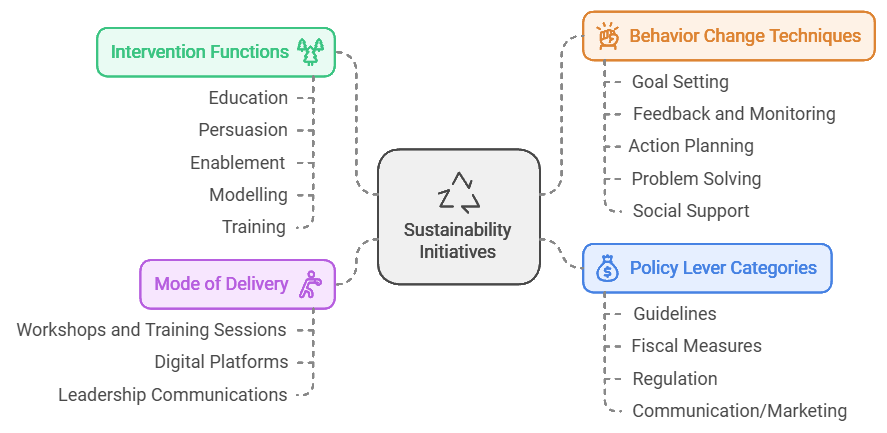Introduction
This document outlines a formal intervention using the Behavior Change Wheel (BCW) framework in response to the urgent need for comprehensive sustainability strategies in businesses. The intervention aims to implement a whole-system approach to sustainability, integrating environmental stewardship, social responsibility, and economic viability. This strategy addresses immediate environmental concerns, fosters social equity, and drives economic growth, ensuring a sustainable and flourishing enterprise.

Defining the Problem in Behavioral Terms
Businesses often operate in silos, focusing on short-term financial gains while neglecting environmental and social impacts. This behaviour leads to unsustainable practices that can cause long-term damage to the planet and society. The primary problem is the need for integrated sustainability practices encompassing environmental, social, and economic dimensions.
Selecting the Target Behavior
This intervention targets the adoption of a whole-system approach to sustainability by business leaders and decision-makers within organizations.
Specifying the Target Behavior
The specified target behaviour involves:
- Regularly assessing and integrating sustainable practices across all business operations.
- Engaging in continuous improvement and reporting on sustainability metrics.
- Fostering a corporate culture that prioritizes long-term sustainability over short-term profitability.
Identifying What Needs to Change

Capability
- Psychological Capability: Enhance knowledge and understanding of sustainability practices and their long-term benefits.
- Physical Capability: Improve access to tools and technologies that support sustainable practices.
Opportunity
- Physical Opportunity: Create environments that facilitate sustainable practices, such as green offices and sustainable supply chains.
- Social Opportunity: Cultivate a business culture and external networks that support and encourage sustainability.
Motivation
- Reflective Motivation: Foster beliefs and attitudes that value sustainability as essential to business success.
- Automatic Motivation: Develop habits and routines in daily operations that incorporate sustainability principles.

Identifying Intervention Functions
- Education: Increase knowledge and skills regarding sustainability practices.
- Persuasion: Encourage positive attitudes towards sustainability through incentives and persuasive communication.
- Enablement: Enhance means and reduce barriers to engaging in sustainable practices.
- Modelling: Demonstrate sustainable practices through leadership and peer examples.
- Training: Provide specific skills development for implementing sustainability practices.
Identifying Policy Lever Categories
- Guidelines: Develop and distribute guidelines that outline expected sustainable practices.
- Fiscal Measures: Implement tax breaks or financial incentives for businesses adopting sustainable practices.
- Regulation: Establish regulations that mandate specific sustainability standards.
- Communication/Marketing: Promote sustainability through campaigns and public relations efforts.
Identifying Intervention Content – Behavior Change Techniques (BCTs)
- Goal Setting: Set specific, measurable, achievable, relevant, and time-bound (SMART) goals for sustainability.
- Feedback and Monitoring: Provide regular feedback on sustainability performance.
- Action Planning: Develop detailed action plans for integrating sustainability into business operations.
- Problem Solving: Equip teams to identify and solve sustainability-related problems.
- Social Support: Foster a supportive network that encourages sustainable practices.
Identifying Mode of Delivery
- Workshops and Training Sessions: Conduct in-person and virtual training sessions to develop sustainability skills.
- Digital Platforms: Use online tools and platforms for training, monitoring, and feedback.
- Leadership Communications: Leverage top management communications to reinforce sustainability’s importance.
Conclusion
This intervention, grounded in the Behavior Change Wheel framework, is designed to foster a shift towards a whole-system approach to business sustainability. By addressing the components of capability, opportunity, and motivation through targeted intervention functions and behaviour change techniques, businesses can achieve a sustainable balance between environmental stewardship, social responsibility, and economic viability. This holistic approach addresses current needs and lays a foundation for future generations to thrive in a balanced and flourishing ecosystem.